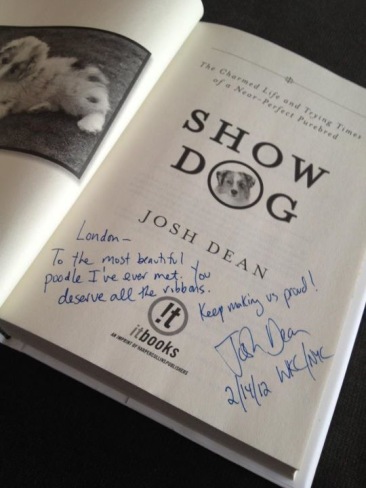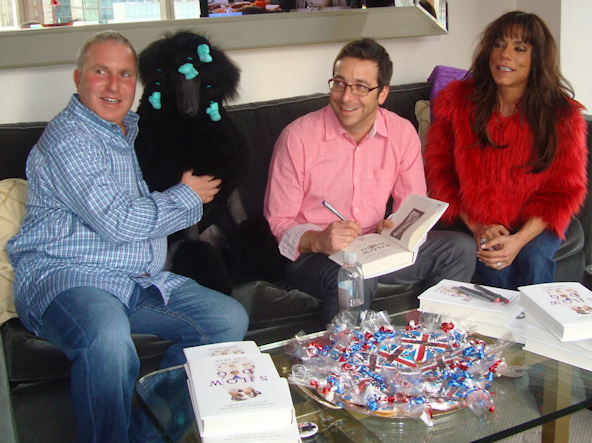Show Dog – An Interview with Author Josh Dean
Written on June 6, 2012 at 8:50 am
![]() Josh Dean is the Author of Show Dog: The Charmed Life and Trying Times of a Near-Perfect Purebred. He has written for such publications as Rolling Stone, Men’s Journal, Cosmopolitan, ESPN Magazine and GQ. He has also been a member of the US Elephant Polo Team. (and yes, we have Elephant Polo footage!)
Josh Dean is the Author of Show Dog: The Charmed Life and Trying Times of a Near-Perfect Purebred. He has written for such publications as Rolling Stone, Men’s Journal, Cosmopolitan, ESPN Magazine and GQ. He has also been a member of the US Elephant Polo Team. (and yes, we have Elephant Polo footage!)
When we’re not busy leasing warehouse and office space at Danburg Management, we are highly involved in world of Dog Shows. Jamie Danburg, the owner of our company and Michele Molnar are the owners of London The Standard Poodle, the reigning AKC/Eukanuba National Champion and winner of 69 Best in Shows (and counting, most ever for a black male poodle ) as of June 1, 2012.
Shows. Jamie Danburg, the owner of our company and Michele Molnar are the owners of London The Standard Poodle, the reigning AKC/Eukanuba National Champion and winner of 69 Best in Shows (and counting, most ever for a black male poodle ) as of June 1, 2012.
Jamie and Michele met Josh at this year’s Westminster Kennel Club Dog Show. They really enjoyed Josh’s book and thought it would be a great idea to promote the book, promote our company, and at the same time support the AKC Canine Health Foundation. We are auctioning a signed copy of the book on Ebay. We’re also matching the proceeds and donating $1 for each new Facebook Like or Twitter Follow from June 1st – June 8th for up to $500.
The following is a transcript of our extended interview with Josh. We also have a 10-minute video interview (click link above) via Skype with additional photos and video clips. We truly enjoyed Josh’s book and he also gives an entertaining interview. And yes, we do include some Elephant Polo footage. Please also see our contest page to win signed copies of Show Dog and other great prizes !
Josh’s book is available at Amazon, Barnes and Noble and other fine booksellers. You can find out more about Josh at www.joshdean.com or www.showdogthebook.com
You can find out more about London the Poodle on his facebook page . We also have a special “London Times” section under “Highlights” (left hand lower column) on our home page at www.danburg.com And please vote for us in Social Madness from June 1 – June 15. We also get points for Facebook and Twitter fans!
Q. What was it that drew you to the story of Show Dog?
A. I love dogs and was looking for a book project that was going to bring together my interests. I really enjoyed the movie Best In Show and always watched Westminster on TV. I like to write about subcultures and little worlds inside America. I thought a book on the world of dog shows would be interesting and entertaining like Best In Show, but a journalistic take on that would be interesting; not only for people who wanted to understand what was going on inside dog shows, but for people involved in dog shows to see how it looked from the outside. Especially from someone who didn’t have any kind of motive going into it, and I just wanted to portray it accurately.
Q. Many people’s perception of show dogs comes from the movie Best In Show which was a satirical look at the world of dog shows. How did your experience compare or contrast with that portrayal?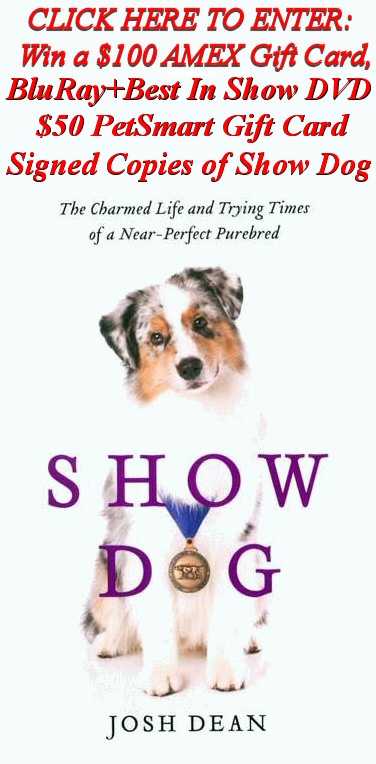
A. By and large most of the people involved in dog shows seem to like the movie. Parts of it may be unfair, but people realize that there are some exaggerations and caricatures and they can laugh at themselves. I think people also get the impression from the movie and Westminster that all the shows are giant and under the lights, but there are thousands of people who come out for local shows a couple of weekends a year and their experience is a bit more simple than that.
Q. How do you come to pick the main character of your book Jack, the Australian Shepherd?
A. I had an idea of looking at dog shows through a dog’s eyes. With 180 breeds, that could be very difficult. I met with a bunch of handlers and went to some shows and hoped that one would jump out at me and that almost literally happened. Jack was kind of a wild child. I don’t remember if he jumped out at me or on me, but he pretty much chose me. I’m an outdoors kind of guy and I like 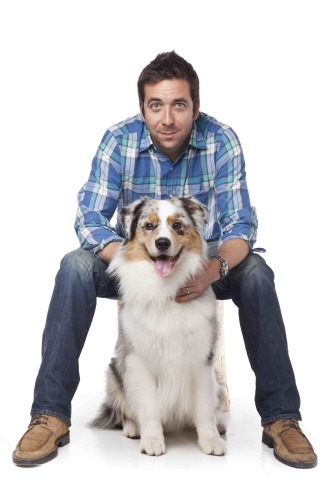 active dogs, so a sporting or herding dog like Jack was a natural.
active dogs, so a sporting or herding dog like Jack was a natural.
Q. How were you received by the dog show community?
A. The handlers were concerned about whether I was going to be complimentary of make fun of them. I met Heather, Jack’s handler in Philadelphia. It took her a while to get back to me. The handlers work as hard as anyone I’ve seen, they are very busy. But after she looked me up and we got to talk she became extremely helpful. She trusted that I would be fair and this book would have never worked without the help of Heather and Kimberly, Jack’s owner.
Q. Would people be more receptive to you today?
A. I think so. When people are upset, they’ll tell you. I’ve gotten a couple of tiny, tiny complaints but I’ve yet to hear anybody really upset with the book. I’m surprised I haven’t upset a lot of people, not because I didn’t do my job right, but usually you offend somebody. But it turns out that it’s been wonderful. For example, Michelle and Jamie have a poodle, a totally different dog, but they just appreciate that the story is out there and they all have similar experiences and the same motivations for showing their dog. I heard that from a lot of people; Portuguese Water Dog people, Pekingese people. The key is dogs, whether your dog is small or large, long hair or short hair they all have the same heart and even if their personalities are a bit different, we love them.
Q. Were you surprised at the bond Jack had with Heather, his handler and the relationship between a dog its handler?
A. I didn’t understand it at first. I thought that it didn’t matter what kind of handler you hired and I didn’t realize how skilled they are. But I’m amazed now and the handlers are one of the fascinating aspects of the entire world of dog shows. The handlers just get it, they can communicate with the dogs whether spoken or unspoken and get them to do things that you and I could never do. Jack is a very challenging dog to work with. Heather, through giving him a look or body language, can make him do whatever she wants. The handlers are also some of the hardest working people I’ve met. They are involved with these dogs 7 days a week and some travel for 45 weeks per year. Most handlers grew up around dog shows, there are no schools and you have to apprentice. If you don’t have a great handler, you may do okay, but you’re not going to win the big shows.
Q. Are there any thoughts of turning Show Dog into a movie?
A. You know, I’m surprised I haven’t heard from Hollywood yet. I have a book agent but not a Hollywood agent yet. I have thought about it. It could be a good drama. I also think that is could make a really good HBO series. It can be edgy and fun and even a little darker.
Q. Do you think the teams on the dog shows are as passionate let’s say as George Steinbrenner was for the Yankees?
A. You do get large groups that back big dogs. They breed and train those dogs. It’s a combination of intense love and care for the dogs and a love of competition and winning. Winning is addictive we all thrive on that competitive aspect.
Q. Knowing that Michele and Jamie campaign a winning poodle – what do you think of poodles and do you have any wisdom to pass along to other poodle owners?
A. I’ve come to really love Poodles. I think I wrote in the book that poodle people should be at the front of the line for people who deserve my apology. Going into writing show dog, I had the common perception that poodles were overly made up with engineered hair and not good for much other than dog shows. But I learned to appreciate that they are great highly intelligent sporty dogs. They are water dogs originally bred by the Germans to retrieve fishing nets. They love to run and catch Frisbees, they’re great in the water and they are actually good for hunting. They have tons of personality and they come in three different sizes, toy, miniature and standard, so there’s one for everyone whether you live in an apartment or on a farm. Or of course you can groom them and make them look beautiful and win a lot of show ribbons. If you’re going to show a poodle, be prepared to spend some money and there is a lot of time involved in prepping the dogs for the show, but poodles win more than just about any breed.
Q. One of your chapters deals with the judging process – can you tell us the title of that chapter and explain?
A. I believe that title was “Pardon While I Fondle Your Dog’s Testicles, Dog Show Judging Explained”. One of the questions I get from dog show viewers and we saw it in Best In Show is: “Is he putting his hand where I think he is?” and the answer is yes. They have to make sure the dogs are “intact”. The object of the shows is to find perfect or near perfect dogs because those are the ones that are best for breeding. That is always the case for London, who is a perfect or near perfect Poodle. In reality, it takes a long time to become a dog show judge and the judges are all experts. The owners and handlers do learn the judges’ biases over time and handlers will seek out certain judges and avoid others. There is a strategy to dog shows and that’s part of it.
Q. Another fun chapter title was “How The Hell Does a Wolf Become a Pekingese? A Brief History of Purebreds.” Tell us what you’ve learned about dog evolution.
A. Dogs descended from wolves, gray wolves, scientists believe, around 10 or 15 thousand years ago to possibly 100,000 years. The people found that the dogs could protect them and do work such as herding. The wolves realized that it was easier to get scraps than to hunt for food on their own. It was a mutually beneficial relationship that grew over time. People also realized about the great diversity in the dog species and their adaptability to breeding. In just a couple of generations, dogs can be selectively bred to carry out a number of purposes from hunting and herding to digging in the ground to being a companion lap dog.
Q. It’s been about a year since we last saw Jack. Can you update us on what he’s doing?
A. Jack is on a bit of a hiatus now and at home and playing a lot of Frisbee. He was first a pet and the owner loves having him around. He’ll go out and show here and there, but Kimberley, the owner is looking for the right backer. She is moving into a house with her fiancé who is a breeder and handler of Aussies, you see a lot of that in the dog show world. We certainly haven’t seen the last of Jack. He was so young when he started that he was a bit hyper and he may be stronger when he calms down a little. He will be signing books with me at the upcoming show in Harrisburg (4/15). He has also done a couple of breedings and is a father.
Q. I know you wrote about relationships in Cosmopolitan. What relationship advice do you have for dog people?
A. First, you better have a partner that is interested in dogs. I think dog people 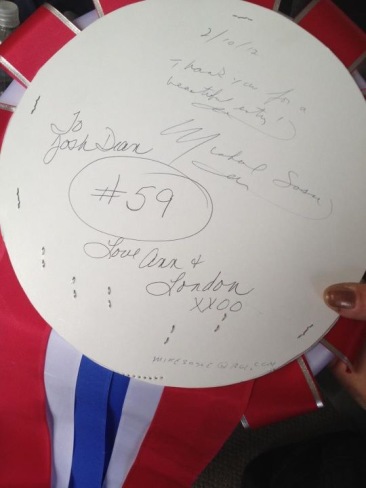 need to marry or date dog people. At least it gives you something to talk about and do together. I think I need to have a dating column co-written by a dog because I think we have a lot to learn from them. Dogs always forgive us, they don’t dwell on our mistakes, they don’t hold grudges; all of these are good quality in humans that we have a lot of trouble with. I think that’s a great idea. Maybe I should do a relationship book written by a dog.
need to marry or date dog people. At least it gives you something to talk about and do together. I think I need to have a dating column co-written by a dog because I think we have a lot to learn from them. Dogs always forgive us, they don’t dwell on our mistakes, they don’t hold grudges; all of these are good quality in humans that we have a lot of trouble with. I think that’s a great idea. Maybe I should do a relationship book written by a dog.
Q. I know you’re now the father of a 2-year old. How’s he doing and is he ready for a dog?
A. My son Charlie is obsessed with dogs. He’s still tries to pull the books down from the shelf shouts “Jack puppy!” at it. I feel it would be kind of like cheating not to get an Aussie now. I also could get one of Jack’s puppies and I thought it would kind of a nice signature, my son having one of his pu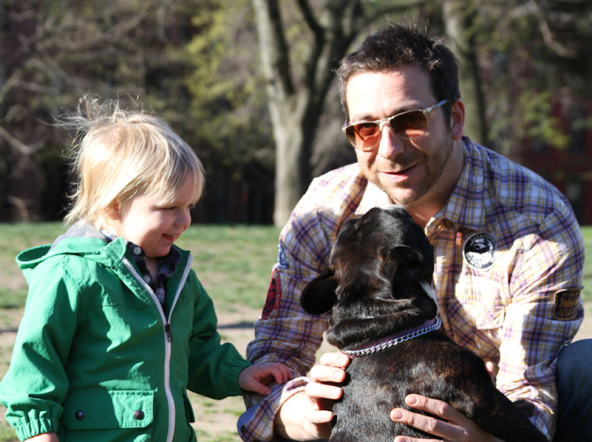 ppies. I travel a lot for work and my wife has to take care of a 2-year old, so it’s not quite the right time, but in a year or two when Charlie is a bit more independent, we’ll probably do it. I think for people out there it is important to get a dog from a good breeder and not from a pet store or puppy mill.
ppies. I travel a lot for work and my wife has to take care of a 2-year old, so it’s not quite the right time, but in a year or two when Charlie is a bit more independent, we’ll probably do it. I think for people out there it is important to get a dog from a good breeder and not from a pet store or puppy mill.
Q. Would you encourage Charlie to participate in Junior Showmanship at an AKC sanctioned event?
A. I would encourage it. That would be a good story. My wife and I have a similar view that we’ll find out what he is interested in and then encourage it. I grew up playing soccer, tennis and baseball because that’s what I liked to do. He seems to love dogs so far so that would be good, but I will try really hard not to force anything on him.
Q. You wrote an article on the five best adventure dogs for guys. Tell us about it.
A. Well my choices were the German Shepherd; which I have a soft spot for; the British Lab, a very affectionate hunting dog; the Malamute, they bark a lot and they’re not for everybody but they’re awesome in the snow and tireless; the English Setter, which I grew up with, just a happy breed. Their hair gets a little matted and they like mud so there is a lot of clean up. You’ll like the fifth one, the Poodle; they’re often in the water and very smart and incredibly sporty. A lot of people don’t think about poodles, but they should. People usually see a lot of hair, but should look under that hair and you’ll find a really sporty dog.
Q. What about the girls and how do you find the best breed for you?
A. Here in New York I see a lot of little dogs, but it depends on what the girl is into. Yorkies are always really big here. It’s hard to pick a bad dog if you do your research. A good breeder will ask you a lot of questions. The best thing people can do is to do a lot of research go to the breed clubs, read the websites. I came up with something good the other day. The process of getting a dog from a good breeder should be like hazing. It should be hard to convince that person to sell you a dog. If a breeder is trying too hard to sell you, it’s probably a bad situation. The good breeders will always check to see if the breed is right for you. You can also go to a dog show and talk to the handlers and breeders who know a lot about their breeds.
Q. What’s next for Josh Dean?
A. I’m looking for a new project. Of course, I’m still promoting the book and I’ve continued to do magazine articles throughout the time I was writing Show Dog. My latest article will be on soccer for ESPN Magazine. My next book will not be a dog book, I probably will come back to it in the future, but I don’t want people to think that’s all I can do.
Q. What’s up with Elephant Polo?
A. A friend of mine, another writer, for whatever reason was in Nepal at the time of the World Elephant Polo Championships. He spoke to a woman who was the American Ambassador’s wife and asked why the US didn’t have a team. She didn’t know and told him to put one together. He discussed it with me at a party and after a couple of drinks it sounded like a great idea. We got some sponsors, created a team and went there in 2008 and 2009. There are with 4 elephants on a team, each with a driver and a guy with a really long mallet. It’s crazy and absurd, but a lot of fun and I can say for 2 years I was on the US Elephant Polo team.
Q. How is it being on the other side of the interview process?
A. It’s fun not to have to think about coming up with the questions, but it’s also strange to talk about your own work. I’m getting used to it.


